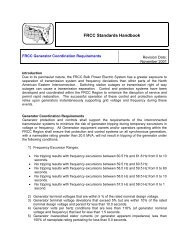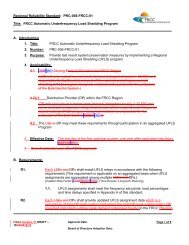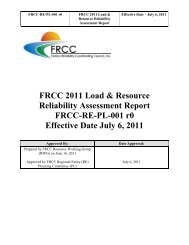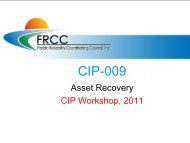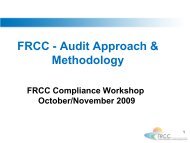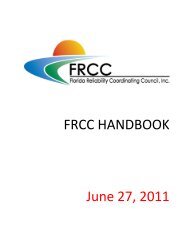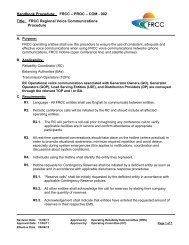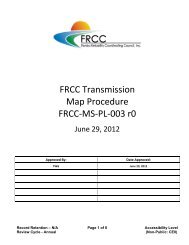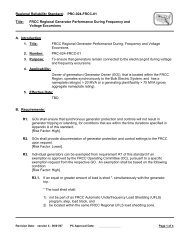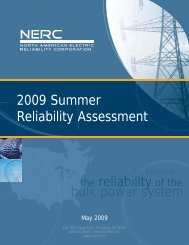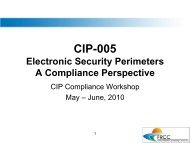2009 Scenario Reliability Assessment - NERC
2009 Scenario Reliability Assessment - NERC
2009 Scenario Reliability Assessment - NERC
- No tags were found...
You also want an ePaper? Increase the reach of your titles
YUMPU automatically turns print PDFs into web optimized ePapers that Google loves.
<strong>Scenario</strong> <strong>Reliability</strong> Self-<strong>Assessment</strong>sTransfer capability assessmentThis study assesses the strength of the SERC interconnected network by determining its ability tosupport power transfers, which are incremental to the base transfers. Transfer capabilities arecalculated using a linear analysis technique in accordance with accepted practice as defined by<strong>NERC</strong> in the document Transmission Transfer Capability, dated May 1995. Both the NormalIncremental Transfer Capabilities (NITCs) and First Contingency Incremental TransferCapabilities (FCITCs) are used in this report. For conditions other than those modeled, responsefactors can be used to approximate incremental transfer capabilities.For the subregional transfers, an AC power flow at the transfer test level was conducted with thefirst reported “hard” limit contingency in effect to check for voltage constraints associated withthe transfer. Compliance with the <strong>NERC</strong> <strong>Reliability</strong> Standards (Table I of <strong>NERC</strong> <strong>Reliability</strong>Standard TPL-001 and TPL-002) was assessed with an AC Contingency Analysis (PSS/Eactivity ACCC); to test for voltage violations and thermal overloads on the power flow studymodel for all submitted contingencies.Calculated transfer capabilities in this report are not extrapolated beyond the study transfer testlevels. Study transfers are simulated by increasing generation in one area while simultaneouslydecreasing generation in another area. When necessary, control area loads are reduced in theexporting system in order to provide sufficient capacity for modeling desired levels of transfer.Monitored circuits that are not significantly affected by the power transfer are not generallyreported. Variations in local conditions typically have a more profound effect on these facilitiesthan do the power transfers under investigation. In general, limiting facilities having a transferresponse calculated to be less than 3.0 percent are omitted from the reported results.The transfer capabilities identified in this report are non-simultaneous, and based on computersimulations of interconnected electric system operations under a specific set of assumedoperating conditions for the 2019 summer peak season. Each simulation represents a single“snapshot” of the operation of the interconnected systems based on the projections of manyfactors that included expected customer demands, generation dispatch, scheduled maintenance,interconnected transmission network configuration, and the electric power transfers in effectamong the interconnected systems. In the real-time operation of the interconnected electricsystems, many of these factors are continuously changing. As a result, the electric powertransfers that can be supported on the transmission systems would vary from one instant to thenext. For this reason, the transfer capabilities reported in this study correspond to a specific set ofsystem conditions for the interconnected network and can be significantly different for any otherset of system conditions. The transfer capabilities reported in this study should be viewed asindicators of system capability.As a measure of projected transmission system performance for the 2019 summer season, thisstudy utilizes assessments of incremental transfer capabilities among the SERC member systems.This study also assessed performance as required by <strong>NERC</strong> <strong>Reliability</strong> Standards forTransmission System Performance.The bubble diagrams that follow depict the subregional First Contingency Incremental TransferCapability (FCITC) for the Reference Case (Figure 1) and the <strong>Scenario</strong> Case (Figure 2). FCITCPage 138<strong>2009</strong> <strong>Scenario</strong> <strong>Reliability</strong> <strong>Assessment</strong>



